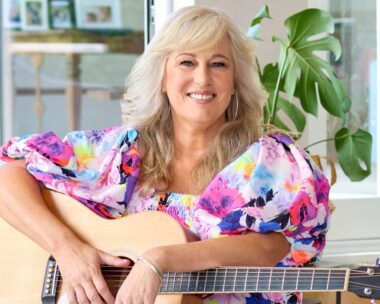Craig Hoyle’s family has been in the Exclusive Brethren since not long after the Plymouth Brethren sect was founded in Dublin in the 1820s. The eldest of seven, Craig was born into a world which revolves exclusively around the church and where any connection to the outside world – including socialising with non-Brethren, watching TV, listening to music or reading a newspaper – is strictly forbidden.
Brought up to believe the world was a cold, hard place, Craig was taught that “Worldlies” (non-Brethren) were weird and cruel, and news media, particularly the Sunday newspapers, were “Satan’s printing presses”. But as a teenager, Craig realised he was gay – one of the worst sins in the Brethren community. He was excommunicated after coming out aged 19 and cut off from his family forever.
These days, Craig, 34, has been in a loving relationship with Ryan Langford, 29, for four years, and is Chief News Director of the Sunday Star-Times. He’s also lifelong friends with Sarah Hall, the former TV3 journalist who told Craig’s story on 60 Minutes soon after he escaped and encouraged him to follow the same career.

“I’m fascinated by cults and while I was researching Exclusive Brethren, I was told about Craig,” explains Sarah, 56, who now executive produces Mihirangi Forbes’ TVNZ and RNZ show Mata Reports. “I’d heard about people being excommunicated and never being allowed contact with their families again, which sounded brutal.”
Over the years, Craig and Sarah have discussed aspects of Craig’s upbringing that he’d never considered strange. “He’ll suddenly say something shocking – like when the cult banned pets, his grandmother drowned her cat,” tells Sarah. But there are also plenty of fun times – like teaching him about pop culture.
“Because TV, music and movies were forbidden, he didn’t know about any of that,” says Sarah. “Opening a bottle of wine and playing iconic songs he’d never heard before was great!”
Adds Craig, “Until primary school, I had no concept of a non-Brethren world. I lived in this isolated community – we went to church every day, four times on Sundays. You’re born into the church, your family and friends are in it, you marry into it and you work for a church business.”
Craig was one of two Brethren cousins sent to the local state primary school.

“We didn’t need physical barriers to separate us from the other kids – the psychological ones were plenty strong enough,” he recalls. “If the TV got rolled out in class, for example, Lydia and I would have to sit in the hallway until the programme was over. We’d also go home for lunch as eating with Worldlies is forbidden.”
When he started learning about current affairs, Craig realised he knew nothing. But this train of thought wasn’t encouraged.
“We were told the outside world was harsh and unwelcoming, and non-Brethren were evil. If they were nice, that proved their deceit. If they weren’t, it proved they were horrible. They had a buck each way!”
But it wasn’t until Craig’s teenage years that the wheels started to fall off. His mother became sick from gall bladder surgery complications and his father, who had battled depression throughout Craig’s childhood, would regularly work until he collapsed, and had to be hospitalised.
“Mum nearly died, which I think tipped Dad over the edge,” recalls Craig. “I remember one terrible day when I was 16, Dad collapsed again, but this time, he hit his head on the kitchen bench. My brother found him in a pool of blood and he was taken to hospital. Dad was at one end of the hospital getting stitched up and Mum was at the other end getting emergency surgery.”

Once his parents came home, Craig looked to the church for support. “Mum was bedridden, unable to do anything physically, and Dad was shutting himself in the wardrobe, unable to do anything mentally. But because I was the oldest, the priests said I needed to step up and be a father figure.
“The Brethren are fixated on suffering,” he says. “They believe God will only give you what you can handle, so the more trauma and suffering, the more God must believe in you. It sounds really messed up, but as the pressure ratcheted up, that pain was celebrated. It became an endurance marathon. I was in survival mode, trying to get through. There was no support.”
As Craig started questioning the Brethren’s “truth”, he was also trying to decipher his own feelings. “I didn’t even know the language to explain what being gay was. Then around 2003, the church started campaigning against the Civil Union Bill, which would allow same-sex couples to formalise their relationships.
“I started sneaking looks at newspapers whenever I could and listening to the whispers. Then, when the Brethren got involved in politics in 2005, I understood that what they were saying to journalists wasn’t true.”
Discovering the church wasn’t always truthful created a huge sense of betrayal and Craig started to do his own research. He discovered that other members who had left the church had been erased from all Brethren records.
“I’d never questioned why my grandmothers were single. Both my grandfathers had been kicked out of the church, so there was no record of them. In the official Brethren records, my grandmother was listed as having four children. I learned that actually she had six, but two had been excommunicated, so were wiped from the system. There had been so much loss and trauma.”
Craig realised that what had happened to them could easily happen to him too.
Coming out as gay was a momentous decision, but by the time Craig turned 19, he knew his personality was fundamentally incompatible with the Brethren’s demands.
“I was becoming aware of other people who’d felt the same,” he says. “Some of them had suppressed their feelings, married and had kids, but many had got to their thirties or forties and then left anyway. I realised I may be able to do what was asked, but for how long? If I’d got married, had kids and started a business, the collateral damage would have been huge.”

After an agonising process, during which Craig was drugged by a church doctor, sent to Brethren leader Bruce Hales in Sydney, and separated from his siblings, confined to his house with a devastated mother and an angry father, Craig was excommunicated on October 31, 2009. He moved in with Courtney and Mel, a rainbow couple in Invercargill, and just weeks later was contacted by Sarah.
“I was out from the Brethren’s control and I was a blank slate,” tells Craig. But to Sarah, Craig was extraordinary.
“He’s an amazing storyteller, and he’d taken detailed notes from his meetings with the priests and knew the importance of them,” she says. “His intellect was immediately apparent. But what really struck me is how measured he was. He felt a strong sense of injustice and had a natural ability to tell his story factually and thoughtfully.”
Still, the idea of becoming a journalist was surprising to Craig, so Sarah and the 60 Minutes team encouraged him to travel. And he did – to 47 countries.
“I learned so much,” says Craig. “Some things were shocking but inspiring. Visiting Auschwitz, for example, taught me that although what had happened to me was terrible, others had suffered more. That put my trauma into context.”
On his return, Craig started at TV3 while a first-year journalism student.
“In two years, I went from never having seen a television to working in a TV newsroom. Looking back, I have no idea how I did that!”

Since then, he’s also worked across print newsrooms and has told his story publicly – frequently being lambasted by Brethren for it. “I always make the distinction that the system is evil, but the people within it aren’t. Brethren members, by and large, are nice but many of them are trapped.
“The cost of stepping out against the system is massive. During my excommunication, when I was separated from my siblings, I asked my mother how she could let this happen. She replied, ‘What choice did I have?’ Disowning me was the only way she’d get her other six children back.”
These days, Craig’s “family” includes Sarah and her husband Grant, Ryan, and many former Brethren members. Even now, he admits it can be hard working out his true feelings.
“Sex of any kind, let alone gay sex, carried guilt and shame, so working through that was hard. I constantly have to take a step back and work out what I feel, versus what the Brethren told me to feel.”
He’s quick to point out that not everything is due to childhood trauma, however.
“A few of us ex-Brethren were talking about how hard it is to get a job and a flat, and a neighbour piped up, saying, ‘You do realise these problems aren’t unique to Brethren?’ That was so illuminating. It made me realise not every problem is because of my past.
“Meeting Sarah has been life-changing. I wouldn’t be where I am today without her. She went above and beyond, and was my inspiration. She’s taught me that being a journalist isn’t about just going out there and repeating facts – it’s about making a difference.”
Sarah adds, “He’s made a significant impact on my life too. He’s a very good human and an amazing storyteller. We couldn’t be more proud.”

HELPLINE INFORMATION
Need to talk? Free call or text 1737 any time for support from a trained counsellor.
Lifeline – 0800 543 354 (0800 LIFELINE) or free text 4357 (HELP).
OutLine Aotearoa– 0800 688 5463 (0800 OUTLINE) provides confidential telephone support, online chat and rainbow mental health support between 6pm-9pm every day.
 Robert Trathen
Robert Trathen


